|
|
|
Sort Order |
|
|
|
Items / Page
|
|
|
|
|
|
|
| Srl | Item |
| 1 |
ID:
177501
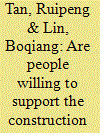

|
|
|
|
|
| Summary/Abstract |
Under the background of removing the subsidies for the new energy vehicles step by step and increasing the subsidies for the charging facilities in China, getting a comprehensive understanding on public's perception and attitudes towards new energy vehicles and charging facilities is significant to the policymakers. To fulfil these goals, we design and perform a random survey in Beijing, Shanghai, Guangzhou and Shenzhen, the four first-tier cities in China from July 2019 to December 2019. In the survey, we not only investigate the public's attitudes to new energy vehicles but also ask the willingness to pay (WTP) for the use of charging facilities. We find that those persons who are male, younger or having higher family monthly income are willing to pay more for the use of charging facilities. If the interviewee has better knowledge about the new energy vehicles or considers that the new energy vehicles can improve the air quality, he/she also would like to pay more. Finally, the WTP for the charging facilities is estimated to be 0.836 yuan/kWh extra and WTP for different group of interviewees is also analyzed. Therefore, in the initial development of charging facilities, subsidies are necessary but they should be removed later.
|
|
|
|
|
|
|
|
|
|
|
|
|
|
|
|
| 2 |
ID:
185689
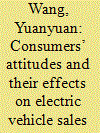

|
|
|
|
|
| Summary/Abstract |
There are close links and interactions among consumers' attitudes, the construction of charging infrastructure, and the diffusion of new energy vehicles (NEVs). This study focuses on consumers' sentient attitudes toward charging infrastructure and the effect of consumer attitudes toward the construction of charging piles and NEV sales using natural language processing technology and the panel vector autoregressive method. Consumers' sentient attitudes (i.e., positive, negative, and neutral) were inferred by analyzing consumer comments on charging infrastructure obtained from the internet. The key reasons for consumers' negative attitudes were further investigated, and the diversity in their attitudes was explored at the city level. The results show a growing concern for consumers about charging infrastructure since 2013. The overall satisfaction of consumers has constantly improved. The top pain points that cause consumers' negative attitudes are inconvenient charging, charging dilemmas, inability to install private charging piles, etc. Consumers' negative attitudes have a significantly positive impact on the charging piles’ construction. It also has a significantly negative impact on the sales of NEVs, but the effects are themselves short-term. Usually, the impact of negative attitudes is stronger than that of positive attitudes.
|
|
|
|
|
|
|
|
|
|
|
|
|
|
|
|
| 3 |
ID:
149937
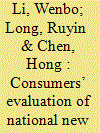

|
|
|
|
|
| Summary/Abstract |
The Chinese government has issued numerous policies to promote the development and adoption of new energy vehicles (NEVs) to address the problem of excessive energy consumption and environmental pollution. In this study we divided these policies into seven categories: macroscopic, demonstration, subsidization, preferential tax, technical support, industry management, and infrastructure. Since consumers’ opinions affect the policy choices of government, based on questionnaire data we use a four paradigm model to analyze the consumers’ evaluation of each policy in terms of perceptions of importance and satisfaction. The results show that macroscopic policies are perceived to be of high importance and satisfaction, whereas for industry management policies they are perceived to be of low importance and satisfaction. The importance perceptions of preferential tax and demonstration policies are low, whereas perceptions of their satisfaction are high. Perceptions of the importance of subsidization, technical support, and infrastructure policies are high, whereas perceptions of their satisfaction are low. We find that the subsidization, technical support, and infrastructure policies need urgent improvement. Finally, we put forward several suggestions to improve the current policies and increase the consumers’ intention to adopt NEVs.
|
|
|
|
|
|
|
|
|
|
|
|
|
|
|
|
| 4 |
ID:
186439
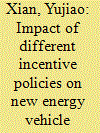

|
|
|
|
|
| Summary/Abstract |
License plate control and preferential policies are both significant for promoting New Energy Vehicles (NEVs) in China, and it is important to be aware of the impact of different policies on NEV demand. This study first conducts a survey based on questionnaires answered by 572 residents from Beijing and Shanghai. The conditional-logit model and mixed-logit model are then utilized to analyze the impact of different incentive policies (i.e., auction, lottery and queueing), vehicle attributes, and consumer attributes on China's NEV demand in gigantic cities. The results show that, i) the incentive effect of license-plate auction for purchasing NEVs is better than that of license-plate lotteries and license-plate queueing. ii) there is an evident promotion by the tax exemption policies in Beijing and Shanghai. iii) people hope that the rate of change in subsidies for battery electric vehicles (BEVs) is tied to BEV recharge mileage. iv) among those who have a high demand for purchasing a vehicle, their primary purpose is to commute to work. v) those who have BEV, live in other cities, or have urgent purchasing needs are likely not to choose NEVs. Policy implications have been proposed to promote NEVs in China's gigantic cities.
|
|
|
|
|
|
|
|
|
|
|
|
|
|
|
|
| 5 |
ID:
125525
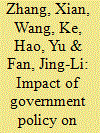

|
|
|
|
|
| Publication |
2013.
|
| Summary/Abstract |
To reduce gasoline consumption and emissions, the Chinese government has introduced a series of preferential policies to encourage the purchase of new energy vehicles (NEVs). However, enthusiasm for the private purchase of NEVs appears to be very low. This timely paper addresses the need for an empirical study to explore this phenomenon by identifying purchase motivations of potential NEV consumers and examining the impact of government policies introduced to promote NEVs in China. A questionnaire survey was carried out. The acceptance of NEVs is measured in three different logistic models: the willingness of consumers to purchase NEVs, the purchasing time, and the acceptable price. The results showed that financial benefits, performance attributes, environmental awareness and psychological needs are the four most important factors influencing consumers' acceptance of NEVs. Among these, performance attributes rather than financial benefits are the most important indicator. The moderating effect of government policies to relations between purchasing intention, time and price is not strong as respected while the policy implications are clear that the 'public awareness of government policy' functions as a moderator in the process of acceptance. These findings could give some hints to the government to make better NEV industry policy.
|
|
|
|
|
|
|
|
|
|
|
|
|
|
|
|
| 6 |
ID:
180132
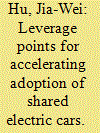

|
|
|
|
|
| Summary/Abstract |
New Energy Vehicles (NEVs), and especially electric cars, are rapidly changing the outlook of the car industry in China, the largest vehicle market in the world. However, an adjustment in subsidy schemes and breakout of COVID-19 appear to slow down the uptake of NEVs in the Chinese market. This raises the question of whether, other less costly, policy instruments can help the transformation towards cleaner vehicles. With the understanding that public support and user acceptance play a key role, we ask whether NEVs as part of increasingly popular car-sharing mode can gain further support, the increased uptake of new energy vehicles. To investigate this question, we perform an online survey, retrieving 1583 questionnaires, and scrutinize the perception of NEVs at the nexus with car-sharing. Relying on the Theory of Planned Behavior and ordered logistic regression model, we demonstrate that attitudes towards environmental protection and perceived benefits (economic and safety) play a key role in accelerating the adoption of shared electric cars. NEVs promotion policies need to specifically target groups by regions. Municipal agencies can substantially support NEV uptake by providing on-street parking exclusively for shared NEVs in cities, and information on the economic and social benefits of NEVs in rural areas.
|
|
|
|
|
|
|
|
|
|
|
|
|
|
|
|
| 7 |
ID:
121336
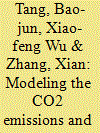

|
|
|
|
|
| Publication |
2013.
|
| Summary/Abstract |
The Chinese government has outlined plans for developing new energy vehicles (NEVs) to achieve energy conservation and emission reduction. This paper used a logistic-curve to predict the market share of NEVs in the next decade, and then calculated the potential environment benefits of each and every car or the total according to the report of IPCC (2006). The results indicated that NEVs were of benefit in achieving above goals, particularly electric vehicles (EVs). However, they will have a limited impact in the short term. Finally, considering the empirical results and the Chinese reality, this paper proposed corresponding recommendations.
|
|
|
|
|
|
|
|
|
|
|
|
|
|
|
|
| 8 |
ID:
176807
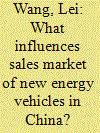

|
|
|
|
|
| Summary/Abstract |
In recent years, new energy vehicles (NEVs), which are considered to be one of the most important ways of solving global warming and energy crisis, have seen rapid development. Owing to the far-reaching policy implemented by Chinese government, the sales volume (SV) of NEVs has seen an exponential growth, and China has become the world's largest consumer of NEVs. The objective of this study was to determine the focus of Chinese consumers with regard to NEVs and to understand how their interests influence the SV. We used data mining combined with deep-learning technologies to investigate a large number of purchase reasons and found that the primary motivating factors were the vehicle, demographic characteristics, and national policy. Additionally, to determine how these factors affect the market, we used correlation analysis to examine the relationship between the SV and the factors. The results indicated that national policies, infrastructure, demographic factors, and safety awareness are closely related to the SV. The findings of this study suggest valuable strategies for government departments, allowing them to publish relevant policies, and manufacturers, allowing them to target specific consumer groups. This approach addresses the environmental concerns by promoting the utilization of NEVs rather than traditional fuel vehicles.
|
|
|
|
|
|
|
|
|
|
|
|
|
|
|
|
|
|
|
|
|